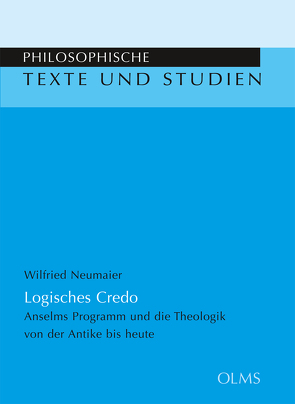
Das Logische Credo befasst sich mit dem anspruchsvollen Theologik-Programm, das Anselm von Canterbury vor fast tausend Jahren konzipierte. Es präzisiert die logische Basis seiner Philosophie und weist ihre Konsistenz durch Modelle nach. Sein Beweis der Existenz Gottes und andere theologische Beweise können so genau überprüft und nachgerechnet werden. Im anschließenden Gang durch die Theologik-Geschichte werden Ansätze von Platon, Aristoteles, Stoikern, Augustinus, Descartes, Spinoza, Leibniz und Gödel analysiert, präzisiert und verglichen und Einwände kritischer Philosophen und Logiker behandelt. Eine dialektische Synthese ermittelt dann den Kern der historischen Theologik, stellt eine beweiskräftige ontologische Sprache für eine aktuelle logische Metaphysik bereit und diskutiert umstrittene ungeklärte Gotteseigenschaften. Für diese werden abschließend anhand von Anselms Daten erstmals korrekte Definitionen entwickelt und stichhaltige Beweise im ontologischen Kalkül gegeben.****************The Logical Credo examines the ambitious theo-logic programme conceived by Anselm of Canterbury nearly a thousand years ago. It clearly defines the logical basis of his theology and uses models to prove its consistency. Anselm’s proof of the existence of God and other theological proofs can thus be precisely examined and reassessed. The following tour through the history of theo-logic analyses, defines and compares the approaches of Plato, Aristotle, the Stoics, Augustine, Descartes, Spinoza, Leibniz and Gödel, and examines the objections of critical philosophers and logicians. A dialectical synthesis identifies the core of historical theo-logic, provides a conclusive ontological language for a contemporary logical metaphysics, and discusses controversial and unexplained characteristics of God. In conclusion, correct definitions for these, based on Anselm’s data, are developed for the first time and substantive proofs are given in an ontological formula.
Aktualisiert: 2023-06-30
> findR *
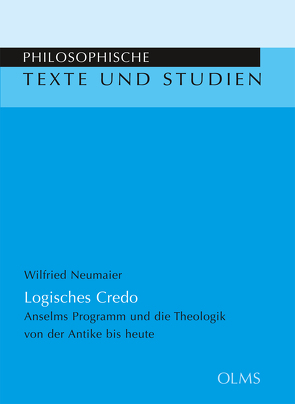
Das Logische Credo befasst sich mit dem anspruchsvollen Theologik-Programm, das Anselm von Canterbury vor fast tausend Jahren konzipierte. Es präzisiert die logische Basis seiner Philosophie und weist ihre Konsistenz durch Modelle nach. Sein Beweis der Existenz Gottes und andere theologische Beweise können so genau überprüft und nachgerechnet werden. Im anschließenden Gang durch die Theologik-Geschichte werden Ansätze von Platon, Aristoteles, Stoikern, Augustinus, Descartes, Spinoza, Leibniz und Gödel analysiert, präzisiert und verglichen und Einwände kritischer Philosophen und Logiker behandelt. Eine dialektische Synthese ermittelt dann den Kern der historischen Theologik, stellt eine beweiskräftige ontologische Sprache für eine aktuelle logische Metaphysik bereit und diskutiert umstrittene ungeklärte Gotteseigenschaften. Für diese werden abschließend anhand von Anselms Daten erstmals korrekte Definitionen entwickelt und stichhaltige Beweise im ontologischen Kalkül gegeben.****************The Logical Credo examines the ambitious theo-logic programme conceived by Anselm of Canterbury nearly a thousand years ago. It clearly defines the logical basis of his theology and uses models to prove its consistency. Anselm’s proof of the existence of God and other theological proofs can thus be precisely examined and reassessed. The following tour through the history of theo-logic analyses, defines and compares the approaches of Plato, Aristotle, the Stoics, Augustine, Descartes, Spinoza, Leibniz and Gödel, and examines the objections of critical philosophers and logicians. A dialectical synthesis identifies the core of historical theo-logic, provides a conclusive ontological language for a contemporary logical metaphysics, and discusses controversial and unexplained characteristics of God. In conclusion, correct definitions for these, based on Anselm’s data, are developed for the first time and substantive proofs are given in an ontological formula.
Aktualisiert: 2023-06-30
> findR *
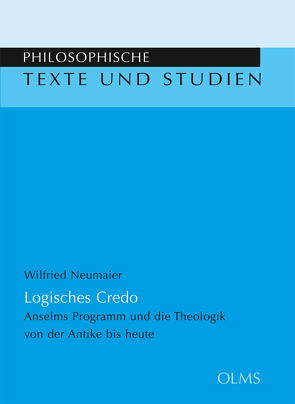
Das Logische Credo befasst sich mit dem anspruchsvollen Theologik-Programm, das Anselm von Canterbury vor fast tausend Jahren konzipierte. Es präzisiert die logische Basis seiner Philosophie und weist ihre Konsistenz durch Modelle nach. Sein Beweis der Existenz Gottes und andere theologische Beweise können so genau überprüft und nachgerechnet werden. Im anschließenden Gang durch die Theologik-Geschichte werden Ansätze von Platon, Aristoteles, Stoikern, Augustinus, Descartes, Spinoza, Leibniz und Gödel analysiert, präzisiert und verglichen und Einwände kritischer Philosophen und Logiker behandelt. Eine dialektische Synthese ermittelt dann den Kern der historischen Theologik, stellt eine beweiskräftige ontologische Sprache für eine aktuelle logische Metaphysik bereit und diskutiert umstrittene ungeklärte Gotteseigenschaften. Für diese werden abschließend anhand von Anselms Daten erstmals korrekte Definitionen entwickelt und stichhaltige Beweise im ontologischen Kalkül gegeben.****************The Logical Credo examines the ambitious theo-logic programme conceived by Anselm of Canterbury nearly a thousand years ago. It clearly defines the logical basis of his theology and uses models to prove its consistency. Anselm’s proof of the existence of God and other theological proofs can thus be precisely examined and reassessed. The following tour through the history of theo-logic analyses, defines and compares the approaches of Plato, Aristotle, the Stoics, Augustine, Descartes, Spinoza, Leibniz and Gödel, and examines the objections of critical philosophers and logicians. A dialectical synthesis identifies the core of historical theo-logic, provides a conclusive ontological language for a contemporary logical metaphysics, and discusses controversial and unexplained characteristics of God. In conclusion, correct definitions for these, based on Anselm’s data, are developed for the first time and substantive proofs are given in an ontological formula.
Aktualisiert: 2023-06-30
> findR *
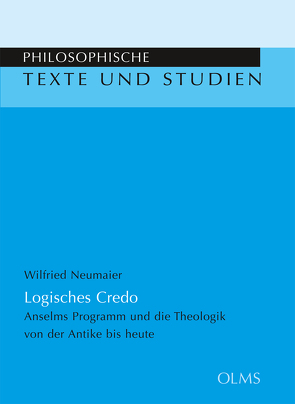
Das Logische Credo befasst sich mit dem anspruchsvollen Theologik-Programm, das Anselm von Canterbury vor fast tausend Jahren konzipierte. Es präzisiert die logische Basis seiner Philosophie und weist ihre Konsistenz durch Modelle nach. Sein Beweis der Existenz Gottes und andere theologische Beweise können so genau überprüft und nachgerechnet werden. Im anschließenden Gang durch die Theologik-Geschichte werden Ansätze von Platon, Aristoteles, Stoikern, Augustinus, Descartes, Spinoza, Leibniz und Gödel analysiert, präzisiert und verglichen und Einwände kritischer Philosophen und Logiker behandelt. Eine dialektische Synthese ermittelt dann den Kern der historischen Theologik, stellt eine beweiskräftige ontologische Sprache für eine aktuelle logische Metaphysik bereit und diskutiert umstrittene ungeklärte Gotteseigenschaften. Für diese werden abschließend anhand von Anselms Daten erstmals korrekte Definitionen entwickelt und stichhaltige Beweise im ontologischen Kalkül gegeben.****************The Logical Credo examines the ambitious theo-logic programme conceived by Anselm of Canterbury nearly a thousand years ago. It clearly defines the logical basis of his theology and uses models to prove its consistency. Anselm’s proof of the existence of God and other theological proofs can thus be precisely examined and reassessed. The following tour through the history of theo-logic analyses, defines and compares the approaches of Plato, Aristotle, the Stoics, Augustine, Descartes, Spinoza, Leibniz and Gödel, and examines the objections of critical philosophers and logicians. A dialectical synthesis identifies the core of historical theo-logic, provides a conclusive ontological language for a contemporary logical metaphysics, and discusses controversial and unexplained characteristics of God. In conclusion, correct definitions for these, based on Anselm’s data, are developed for the first time and substantive proofs are given in an ontological formula.
Aktualisiert: 2023-06-30
> findR *
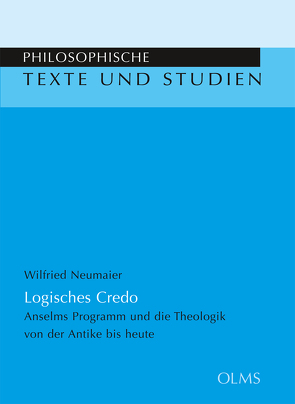
Das Logische Credo befasst sich mit dem anspruchsvollen Theologik-Programm, das Anselm von Canterbury vor fast tausend Jahren konzipierte. Es präzisiert die logische Basis seiner Philosophie und weist ihre Konsistenz durch Modelle nach. Sein Beweis der Existenz Gottes und andere theologische Beweise können so genau überprüft und nachgerechnet werden. Im anschließenden Gang durch die Theologik-Geschichte werden Ansätze von Platon, Aristoteles, Stoikern, Augustinus, Descartes, Spinoza, Leibniz und Gödel analysiert, präzisiert und verglichen und Einwände kritischer Philosophen und Logiker behandelt. Eine dialektische Synthese ermittelt dann den Kern der historischen Theologik, stellt eine beweiskräftige ontologische Sprache für eine aktuelle logische Metaphysik bereit und diskutiert umstrittene ungeklärte Gotteseigenschaften. Für diese werden abschließend anhand von Anselms Daten erstmals korrekte Definitionen entwickelt und stichhaltige Beweise im ontologischen Kalkül gegeben.****************The Logical Credo examines the ambitious theo-logic programme conceived by Anselm of Canterbury nearly a thousand years ago. It clearly defines the logical basis of his theology and uses models to prove its consistency. Anselm’s proof of the existence of God and other theological proofs can thus be precisely examined and reassessed. The following tour through the history of theo-logic analyses, defines and compares the approaches of Plato, Aristotle, the Stoics, Augustine, Descartes, Spinoza, Leibniz and Gödel, and examines the objections of critical philosophers and logicians. A dialectical synthesis identifies the core of historical theo-logic, provides a conclusive ontological language for a contemporary logical metaphysics, and discusses controversial and unexplained characteristics of God. In conclusion, correct definitions for these, based on Anselm’s data, are developed for the first time and substantive proofs are given in an ontological formula.
Aktualisiert: 2023-06-29
> findR *
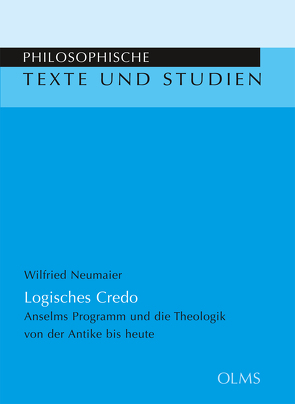
Das Logische Credo befasst sich mit dem anspruchsvollen Theologik-Programm, das Anselm von Canterbury vor fast tausend Jahren konzipierte. Es präzisiert die logische Basis seiner Philosophie und weist ihre Konsistenz durch Modelle nach. Sein Beweis der Existenz Gottes und andere theologische Beweise können so genau überprüft und nachgerechnet werden. Im anschließenden Gang durch die Theologik-Geschichte werden Ansätze von Platon, Aristoteles, Stoikern, Augustinus, Descartes, Spinoza, Leibniz und Gödel analysiert, präzisiert und verglichen und Einwände kritischer Philosophen und Logiker behandelt. Eine dialektische Synthese ermittelt dann den Kern der historischen Theologik, stellt eine beweiskräftige ontologische Sprache für eine aktuelle logische Metaphysik bereit und diskutiert umstrittene ungeklärte Gotteseigenschaften. Für diese werden abschließend anhand von Anselms Daten erstmals korrekte Definitionen entwickelt und stichhaltige Beweise im ontologischen Kalkül gegeben.****************The Logical Credo examines the ambitious theo-logic programme conceived by Anselm of Canterbury nearly a thousand years ago. It clearly defines the logical basis of his theology and uses models to prove its consistency. Anselm’s proof of the existence of God and other theological proofs can thus be precisely examined and reassessed. The following tour through the history of theo-logic analyses, defines and compares the approaches of Plato, Aristotle, the Stoics, Augustine, Descartes, Spinoza, Leibniz and Gödel, and examines the objections of critical philosophers and logicians. A dialectical synthesis identifies the core of historical theo-logic, provides a conclusive ontological language for a contemporary logical metaphysics, and discusses controversial and unexplained characteristics of God. In conclusion, correct definitions for these, based on Anselm’s data, are developed for the first time and substantive proofs are given in an ontological formula.
Aktualisiert: 2023-06-29
> findR *
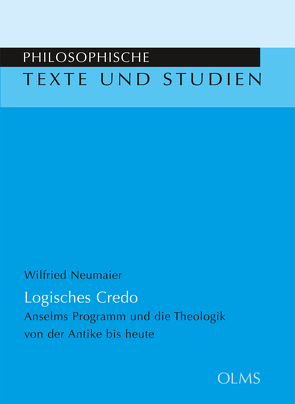
Das Logische Credo befasst sich mit dem anspruchsvollen Theologik-Programm, das Anselm von Canterbury vor fast tausend Jahren konzipierte. Es präzisiert die logische Basis seiner Philosophie und weist ihre Konsistenz durch Modelle nach. Sein Beweis der Existenz Gottes und andere theologische Beweise können so genau überprüft und nachgerechnet werden. Im anschließenden Gang durch die Theologik-Geschichte werden Ansätze von Platon, Aristoteles, Stoikern, Augustinus, Descartes, Spinoza, Leibniz und Gödel analysiert, präzisiert und verglichen und Einwände kritischer Philosophen und Logiker behandelt. Eine dialektische Synthese ermittelt dann den Kern der historischen Theologik, stellt eine beweiskräftige ontologische Sprache für eine aktuelle logische Metaphysik bereit und diskutiert umstrittene ungeklärte Gotteseigenschaften. Für diese werden abschließend anhand von Anselms Daten erstmals korrekte Definitionen entwickelt und stichhaltige Beweise im ontologischen Kalkül gegeben.****************The Logical Credo examines the ambitious theo-logic programme conceived by Anselm of Canterbury nearly a thousand years ago. It clearly defines the logical basis of his theology and uses models to prove its consistency. Anselm’s proof of the existence of God and other theological proofs can thus be precisely examined and reassessed. The following tour through the history of theo-logic analyses, defines and compares the approaches of Plato, Aristotle, the Stoics, Augustine, Descartes, Spinoza, Leibniz and Gödel, and examines the objections of critical philosophers and logicians. A dialectical synthesis identifies the core of historical theo-logic, provides a conclusive ontological language for a contemporary logical metaphysics, and discusses controversial and unexplained characteristics of God. In conclusion, correct definitions for these, based on Anselm’s data, are developed for the first time and substantive proofs are given in an ontological formula.
Aktualisiert: 2023-06-29
> findR *
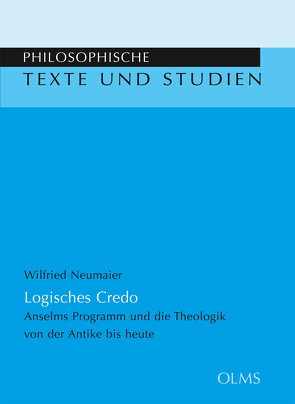
Das Logische Credo befasst sich mit dem anspruchsvollen Theologik-Programm, das Anselm von Canterbury vor fast tausend Jahren konzipierte. Es präzisiert die logische Basis seiner Philosophie und weist ihre Konsistenz durch Modelle nach. Sein Beweis der Existenz Gottes und andere theologische Beweise können so genau überprüft und nachgerechnet werden. Im anschließenden Gang durch die Theologik-Geschichte werden Ansätze von Platon, Aristoteles, Stoikern, Augustinus, Descartes, Spinoza, Leibniz und Gödel analysiert, präzisiert und verglichen und Einwände kritischer Philosophen und Logiker behandelt. Eine dialektische Synthese ermittelt dann den Kern der historischen Theologik, stellt eine beweiskräftige ontologische Sprache für eine aktuelle logische Metaphysik bereit und diskutiert umstrittene ungeklärte Gotteseigenschaften. Für diese werden abschließend anhand von Anselms Daten erstmals korrekte Definitionen entwickelt und stichhaltige Beweise im ontologischen Kalkül gegeben.****************The Logical Credo examines the ambitious theo-logic programme conceived by Anselm of Canterbury nearly a thousand years ago. It clearly defines the logical basis of his theology and uses models to prove its consistency. Anselm’s proof of the existence of God and other theological proofs can thus be precisely examined and reassessed. The following tour through the history of theo-logic analyses, defines and compares the approaches of Plato, Aristotle, the Stoics, Augustine, Descartes, Spinoza, Leibniz and Gödel, and examines the objections of critical philosophers and logicians. A dialectical synthesis identifies the core of historical theo-logic, provides a conclusive ontological language for a contemporary logical metaphysics, and discusses controversial and unexplained characteristics of God. In conclusion, correct definitions for these, based on Anselm’s data, are developed for the first time and substantive proofs are given in an ontological formula.
Aktualisiert: 2020-10-01
> findR *
MEHR ANZEIGEN
Bücher zum Thema Theologik
Sie suchen ein Buch über Theologik? Bei Buch findr finden Sie eine große Auswahl Bücher zum
Thema Theologik. Entdecken Sie neue Bücher oder Klassiker für Sie selbst oder zum Verschenken. Buch findr
hat zahlreiche Bücher zum Thema Theologik im Sortiment. Nehmen Sie sich Zeit zum Stöbern und finden Sie das
passende Buch für Ihr Lesevergnügen. Stöbern Sie durch unser Angebot und finden Sie aus unserer großen Auswahl das
Buch, das Ihnen zusagt. Bei Buch findr finden Sie Romane, Ratgeber, wissenschaftliche und populärwissenschaftliche
Bücher uvm. Bestellen Sie Ihr Buch zum Thema Theologik einfach online und lassen Sie es sich bequem nach
Hause schicken. Wir wünschen Ihnen schöne und entspannte Lesemomente mit Ihrem Buch.
Theologik - Große Auswahl Bücher bei Buch findr
Bei uns finden Sie Bücher beliebter Autoren, Neuerscheinungen, Bestseller genauso wie alte Schätze. Bücher zum
Thema Theologik, die Ihre Fantasie anregen und Bücher, die Sie weiterbilden und Ihnen wissenschaftliche
Fakten vermitteln. Ganz nach Ihrem Geschmack ist das passende Buch für Sie dabei. Finden Sie eine große Auswahl
Bücher verschiedenster Genres, Verlage, Autoren bei Buchfindr:
Sie haben viele Möglichkeiten bei Buch findr die passenden Bücher für Ihr Lesevergnügen zu entdecken. Nutzen Sie
unsere Suchfunktionen, um zu stöbern und für Sie interessante Bücher in den unterschiedlichen Genres und Kategorien
zu finden. Unter Theologik und weitere Themen und Kategorien finden Sie schnell und einfach eine Auflistung
thematisch passender Bücher. Probieren Sie es aus, legen Sie jetzt los! Ihrem Lesevergnügen steht nichts im Wege.
Nutzen Sie die Vorteile Ihre Bücher online zu kaufen und bekommen Sie die bestellten Bücher schnell und bequem
zugestellt. Nehmen Sie sich die Zeit, online die Bücher Ihrer Wahl anzulesen, Buchempfehlungen und Rezensionen zu
studieren, Informationen zu Autoren zu lesen. Viel Spaß beim Lesen wünscht Ihnen das Team von Buchfindr.







